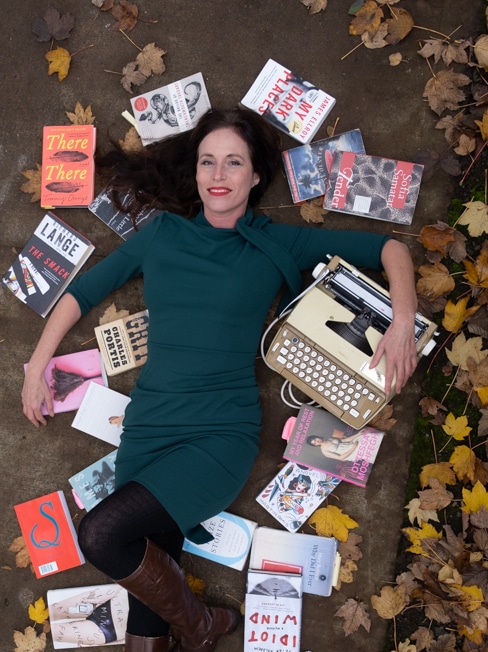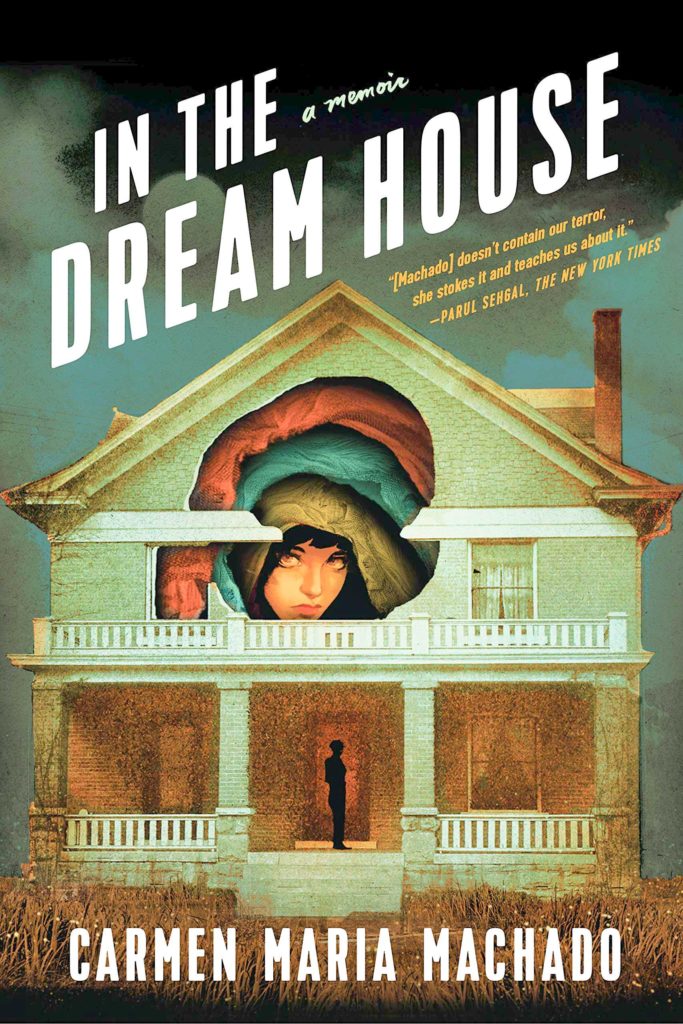We’re thrilled to introduce the 2022 Oregon Literary Fellowship recipients with individual features on our blog! Out-of-state judges spent several months evaluating the 400+ applications we received, and selected nine writers and two publishers to receive grants of $3,500 each. Literary Arts also awarded two Oregon Literary Career Fellowships of $10,000 each. The 2023 OLF applications will open in May 2022. The deadline to apply is Friday, August 5, 2022.

Clemintine Guirado is a creativity consultant and writing coach. She was a Wallace Stegner Fiction Fellowship at Stanford University, a Carl Djerassi Fiction Fellowship at the University of Wisconsin, and has published short stories in Best New American Voices, Rainbow Curve, Comet Magazine, and 580 Split. She holds an M.F.A. in English and Creative Writing from Mills College in Oakland, CA.
Category: Walt Morey Fellowship
Pronouns: She/her
Q&A with Literary Arts
Who are some writers you look up to or who move you to write?
This would be a very long list that overwhelms me to begin.
Two weird little enduring favorites are Death Will Have Your Eyes: A Novel About Spies by James Sallis (imagine if a poet wrote a spy novella–don’t read it for plot) and the novel Why Did I Ever by Mary Robison which is structured in little crots to reflect the attention deficit of the protagonist and the author–it’s a book you could read backwards or pick up at any juncture and enjoy.
When I graduated high school, I moved to St. Croix, USVI and tended bar in a Mexican restaurant called Luncheria in the same courtyard as a bookstore with a wee pond out front inhabited by tiny green frogs with gilded backs (live frogs with metallic gold markings). That is where I first read Jamaica Kincaid and Robertson Davies, both of whom knocked my socks off and still do.
All the Mary’s: Gaitskill, Robison and Robinson.
Sofia Samatar and Mark Richard. Toni Morrison and Joyce Carol Oates. Ottessa Moshfeg and Martin Amos. Miranda July and Jerzy Kosiński. Joan Silber and Richard Rodriguez. Wells Tower and Pete Dexter.
With pandemic brain, I found myself enjoying YA novels: The Nest by Kenneth Oppel, Opiod Indiana by Brian Allen Carr.
Some of the grownup books that were able to hold my limited attention in the past two years:
The Body in Question by Jill Cement–a very spare novella about a woman having an affair with another juror while sequestered.

Long Division by Kiese Laymon–the opening to which introduces one of the most compelling, likable, first person narrator’s I’ve ever encountered.
Jane Allison’s Nine Island—an autobiographical novel about an Ovid translator ruminating on whether it’s time to give up on sex (spoiler alert–it’s not).
Carmen Maria Machado’s memoir In the Dream House–which is really fun in spite of being an abuse memoir. It uses the conceit of playing with the tropes of a different genre in each short chapter–“Dream House as American Gothic” “Dream House as Chekhov’s Trigger” “Dream House as Choose Your Own Adventure.” I also fan-girled out on her and read every book she recommended online (all fantastic).
I also read Jen Beagin’s delightful Vacuum in the Dark about a maid getting into artsy trouble in Taos, New Mexico (where I’d recently lived). It’s basically four short stories stitched together, as is her earlier work, Pretend I’m Dead.
What are your sources of inspiration? Of joy?
Besides books, I’m inspired by paintings—Kim Dingle’s violent, pinafored toddlers—”Black Girl Dragging White Girl” is a favorite.
My California Gothic family provides a lot of material.
Sometimes I like to take in the opening montage/imagery and theme songs of Nordic and Belgium noir television Shows: The Hotel Beau Sejour uses an adaptation of “Alone and Forsaken” by Hank Williams translated into Flemish by Mauro Pawlowski and Ciska Vanhoyland.
Joy, for me, usually comes from something weirdly specific: meditation or prayer immediately followed by a chance encounter with my favorite natural phenomenon: murmuration (of starlings for example) or a wind blowing petals, seeds or leaves around.
How would you describe your creative process?
I am an idea factory but struggle with organization and structure, so I’ve created personalized templates and rubrics to triage and corral all the wild horses.I have a writing group with two friends from Mills college in Oakland, Amadeo Quillici and Daphne Young—we often do writing exercises together.
I run story drafts by my cousin, the painter Mark Dutcher and by the poet, Maw Shein Win. Mark has a keen eye toward the zeitgiest and roots out anything obnoxious. Maw is a brilliant sentence-smith and grammarian.
What is most exciting about receiving a fellowship?
In a lonely year, the award was a welcome ray of “fellowship” in the communal sense of the word.
What are you currently working on?
I’m working on a novel called The Universal Detectives—-a stripper Rashômon.
What has kept you writing through the pandemic? Has your process changed? Has the content changed?
I wasn’t one of the ultra-productive pandemic writers. I found myself resenting Ottessa Moshfeg. I wrote a lot of shorter pieces geared toward contests.
I did write one flash-fiction about a woman having sex with a married man in the woods in Sag Harbor outside his mother-in-law’s estate while his doctor wife saved lives in the city.
What advice do you have for future applicants?
My advice for writers in most circumstances (and for myself) is to learn to find pleasure and meaning in the process, not just external validation. Life is lived while your fingers are on the keys.
Any book (or movie, show, album, etc. ) recommendations?
- A new book: Beasts and Creature by Amanda Rose Howland. An unconventional novel about a noise musician in Cleveland, Ohio who is dealing with crack addiction, kidnap, and the creative process.
- An old book: The Insult by Rupert Thompson. A man with a bullet-related brain injury is permanently blinded—or so his doctor tells him. Then he discovers he can see in the dark and launches into a strange nocturnal world.
- Lebohang Kganye’s photography series Ke Lefa Laka: Her-story, a subtle but moving sequence in which she recreated photos of her deceased mother overlaid with images of herself wearing her mother’s clothes.
- Psychogeography. While many writers are familiar with the useful restraints of Oulipo, psychogeography is my favorite French nonsense. A philosophy based around the exploration of urban environments, it involves “dérive”—practices like placing a tea cup over a map, tracing a circle, then walking the route, regardless of whether you must cut across private property.
- The podcast “Good One: A Podcast About Jokes” by Vulture’s Jesse David Fox. Check out the episode discussing Sara Schafer’s “Hobby Lobby” in which we learn the real life connection between the Hobby Lobby craft store and Isis.
Excerpt from The Universal Detectives
First off, it wasn’t Christmas, it was a freaky Spring. I met Paris in Miami at a club out in Hialeah near the Airport, called the Butter Room. I got the cheapest, closest hotel I could find in the strip of boarded up buildings, bonds bailsmen’s offices, and fast-food joints. The empty air conditioner shell in my room could be conveniently popped out of the wall like a dog door if someone desired to come in to rob or rape. There was a Chinese restaurant attached to the hotel. Most of the dishes were Chinese but there were a couple Latin items, including “Camarones” with tomatoes and onions, which is what I lived on. In gold, embossed on the front of the padded, oxblood menu, it read: Golden Dynasty-the finest Chinese Food in Nicaragua.
When I tried to go for a walk, I was mistaken for a prostitute three times. The third time, it was a squad car cozying up to me. A policeman in serial killer shades asked repeatedly if I was okay and wasn’t taking yes for an answer.
“I said I’m fine.”
“Then what are I doing walking in the middle of the street?” He flexed his meaty bronzed arm where it rested on the window ledge of his car.
This wasn’t true, I was at the edge of the street, hugging the riotous bougainvillea. I guess I looked sweaty and glazed-eyed—I still had jet lag. I might have been limping a little in my wooden platform clogs.
“Where am I supposed to walk?” I said. “There’s no sidewalk.”
“Lady, when there’s no sidewalk, there’s a reason.”
Judge’s Comments
“’Walking to Camano,’ an excerpt from Clementine Guirado’s novel-in-progress (a literary thriller), is a compellingly told by a completely engaging narrator. Guirado’s prose draws you in from the start. The narrator’s voice is quirky, intelligent, withholding. What she keeps from us spurs us to read on, And in so doing, Guirado evokes the lives of these hard-working women and of the world of Whidbey Island that has shaped them.”
– David Wright


